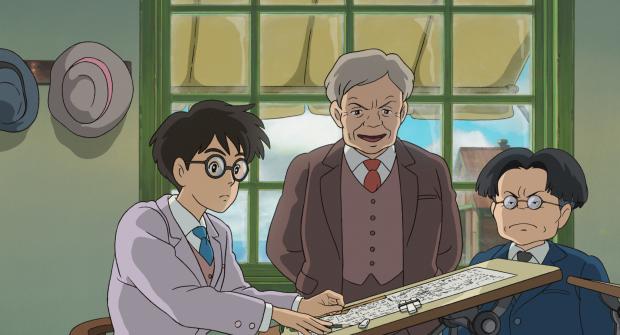The Wind Rises Movie Review
There are few Japanese filmmakers as universally revered as Hayao Miyazaki. As full length anime films rarely grace our cinemas, to many in the west Studio Ghibli has become synonymous with Japanese animation. Often lovingly referred to as the Eastern Walt Disney, his unique and fantastical films have earned him the adoration of both critics and mainstream audiences alike. Now, after an illustrious thirty year career, the 74 year old is gracefully bowing out of filmmaking. But luckily for us, not without giving us one more look into his world.
As a Ghibli fan, I was in two minds about watching The Wind Rises. Miyazaki’s films usually fall into one of two categories: the fantastical, and those that are more grounded in reality. While I enjoy his fantastical side, I feared I would never see him create another film like the emotionally devastating World War Two epic Grave Of The Fireflies, and was resigned to another playful affair like My Neighbor Totoro.

Yet somehow, The Wind Rises manages to successfully combine elements from both types of Ghibli film. For his final hurrah, Miyazaki opts to return to the real world, and transports the viewer to early twentieth century Japan – and a time when the country was very much still feeling the after effects of the first World War. The story revolves around real life aeronautical engineer Jiro Horikoshi, the mind behind many of Japan’s greatest WW2 fighter planes. Dreaming of flight from a young age, Jiro yearns to be a pilot himself, but his poor eyesight prevents him from doing so, and instead he decides to devote his life to designing them.
Initially the tone of the film is fairly whimsical, but as the film progresses, darker undertones creep in. Between Jiro’s interactions with the typically charming characters that inhabit Miyazaki’s films, evidence emerges of a devastated post war economy: you bare witness to the SS beating Jews in an alleyway, and feel the often unspoken but omnipresent threat of war lurking behind the scenes. A far cry from Ponyo.

The typically gorgeous Miyazaki art style is (of course) present here, and as the tone of the film shifts to darker subject matter so too does the colour palette. The animation for his final film may be what you’d expect from Ghibli, but their signature art style has aged well and still oozes with detail and character. As it’s based on a true story, the most imaginative drawings are saved for the film’s dream sections, and they offer a nice change of pace from the rest of the animation’s adhesion to reality.
While the war that forms the backdrop gives the latter part of the film a sense of urgency, what you see of it is merely passing glimpses, and although crucial to the film’s atmosphere, the focus of the story is very much on Jiro’s life work. The only problem with that is our protagonist is initially a hard character to care about. Driven only by his quest to design the perfect plane, he often shows very little personality, humour, or anything even remotely resembling charisma. Luckily, the other characters more than make up for this, and Jiro’s refreshingly grounded friend Honjo goes a long way to remedying this. As the film progresses, Jiro slowly becomes more relatable, which is largely down to the second half’s tender love story.

The cutesy and carefree nature of the first half is in stark contrast to the final act, and as Jiro becomes more likeable, the world around him becomes increasingly consumed by war and tragedy. Whilst it could be argued that Mayazaki glorifies Jiro’s work and excuses him of his culpability for the horrors his planes caused, it is made perfectly clear throughout that Jiro has no interest in war. This is not a pro war film, and while Jiro is attributed to creating the planes that destroyed Pearl Harbour, much of the controversy the film has garnered for supposedly glorifying war is undeserved.
Though whimsical and charming, the subject matter alone makes this Studio Ghibli’s darkest film of recent years, and when combined with its tragic ending this is a film that you won’t soon forget. Miyazaki’s work has touched a generation, and while he will certainly be missed, this thought provoking tale is the perfect way to say goodbye.

VERY GOOD. This release has what it takes. Well-written, well-made and well worth your time and money. If we slap an 8 on it, then it comes highly recommended.
Review based on pre-release screening.




